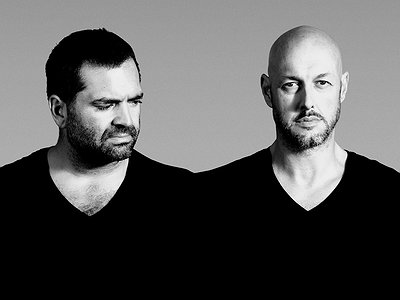One of the interesting things about Pig&Dan is that you're working very closely together on productions, but actually in two different studios. How different are your studios and can you describe the feedback and production process to me in a bit more detail? In how far, do you feel, does your process yield different results from a situation where you would both be sitting in the same room?
Well, we do write most of our music on planes these days due to our schedule, so we are creating together. The funny thing is we know each other so well that really we both write with the other one's opinion in mind. I pretty much know what Igor would do with this and that and he's the same. We of course send things back and forth or slap it on a USB on the plane and pass it all back and forth. This album was pretty different though. We did a lot of it together in the same studio.
As far as gear goes, of course our Macs are the backbone of the whole process. We use a few hardware bits like the Moog Sub 37 and the Juno 106. Apart from that we use synths softsynths from Arturia, Waves. And we love Signal from Output. Plugin wise we use a lot of UAD and Brainworx to add that warmth.
[Read our feature on the Juno 106]
It has today almost become customary to radically change pieces in the act of mixing and to increase the creative input of the DJ even to the level of the actual composition. What's your take on that and in how much do you make use of these possibilities yourself? Is there such a thing as 'disrespectful mixing'?
Oh yes, we’ve many DJs destroy a record by adding on to it. There’s really very few out there that can justify whacking loads of effects over a perfectly wonderful record. We like to add some mixes in like a vocal that’s relevant just because that might work out at that moment. But on a whole we are traditional in that we don’t mess too much with what people create. I mean what for really. Music wasn’t created to be messed with I guess …
One of the most important aspects of a DJ set are the transitions from one track to the next. What makes a transition successful from your perspective? What are some of the considerations that go into deciding which track to play next - are these purely subjective to you or are there objective things that work or don't work?
Well its about thinking what would work best for the crowd at that moment. Then its finding a track that meets that criteria and that fits to the current track that’s playing. We do that by ear and using our memory. It's exciting and it’s a challenge we adore.
How do you see the balance between giving the crowd what they want and treating them to something new? What's your take on the idea of the DJ as an "educator" and is the relationship with the dancers a collaborative one or, as Derrick May once put it, a “battle”?
It's all about the balance of playing something that works with what’s going on at that moment. You could drop in a classic that people know to bring back a crowd that are a little lost in “What is all this music” land. It is tricky to find that moment to drop the correct track that everyone knows, but from my experience as a raver those are the tracks that just overwhelmed me on the dance floor. I think a classic or recognisable track is very important to every set. People need to identify with memories sometimes.
It is customary for many DJs to also produce tracks of their own, thereby lifting the former 'division of labor' between the two. How do you feel about this – and in which way can both sides benefit from this? How does your work as a DJ influence your studio productions and vice versa?
I can't say I totally agree that most of them produce and DJ. However the ones that do have much more of a chance of sticking out as something different. They have the chance to drop tunes nobody else has.
With more and more musicians creating than ever and more and more of these creations being released, what does this mean for you as an artist in terms of originality? What are some of the areas where you currently see the greatest potential for originality and who are some of the artists and communities that you find inspiring in this regard?
Well I think because technology has opened the door, this is a wonderful thing. In that I mean that anyone can paint on a canvas even if they're not a trained painter. The computer world has opened this up for people to create music even without any musical background. And that in itself can have fantastic results. I think it's very positive and forever inspiring...
Reaching audiences usually involves reaching out to the press and possibly working with a PR company. What's your perspective on the promo system? In which way do music journalism and PR companies change the way music is perceived by the public?
Of course it's become a necessity. Like in any industry, there’s branding involved and although we haven’t really relied on it in the past its become clear that we must utilise it for us to flourish. Media is more important to this generation compared to those of the past. We rely on media and its platforms to be influenced in everyday life.
It is remarkable, in a way, that DJing has remained relevant for such a long time. Do you nonetheless have a vision of DJing, an idea of what it could be beyond its current form?
Not really, because you can't ever download a performance, and that’s why it's still here to stay in its current form. I can't see it going anywhere else, but maybe that’s because I've lived within it for such a long time. You can't say a guitar player will maybe be like this in the future because it is what it is. Maybe something new will come along. But I don’t think it will be called a DJ.
If you enjoyed this interview with Pig&Dan, make sure to follow them on their website or their Facebook page.



